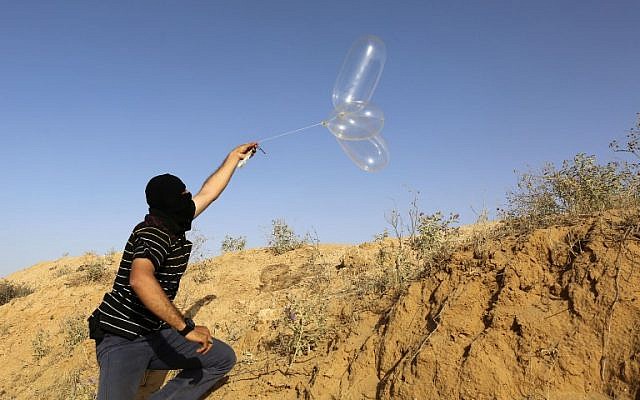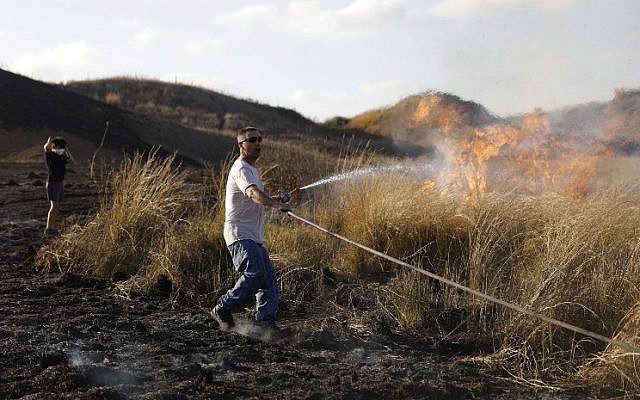But Mandelblit mum on legality of firing at those behind launches, as politicians step up calls for direct attacks

Attorney General Avichai Mandelblit said Monday flaming devices flown toward Israel from Gaza were a “legitimate military target,” but would not comment on the legality of firing at those behind the launches.
“A balloon is an innocent and nice thing, but if it is used for fighting it becomes a legitimate military target,” Mandelblit said at a legal event in Jerusalem.
He stressed, however, that the threat posed by the incendiary objects is not comparable to rocket fire or other attack weapons.
Mandelblit declined to address whether it is legal to target the people launching the kites and said he has not been approached by political or military figures on the matter.
“I have yet to be asked about this and I will leave it to the political leadership to ask and receive an answer,” he said.

The attorney general also addressed Israel’s handling of ongoing weekly clashes on the Gaza border, over which the United Nations and rights groups accused the Jewish state of using “excessive” force. Israel has defended its response, which it says is necessary to prevent the Hamas terror group from using the violent protests, which began March 30, as cover to carry out attacks and attempt to breach the border.
“It is permissible to kill an enemy soldier and this is the basic paradigm against Hamas, but there are other elements in this reality,” Channel 10 quoted Mandelblit as saying. “While it is permissible to kill, it is only necessary to do so if it is impossible to stop them in some other way first.”
He described the situation on the Gaza border as “complex and challenging,” noting Hamas “sends people to the border, among them armed terrorists who want to kill.
“These are combatants for all intents and purposes, and the rules of warfare apply to them, i.e., to kill them,” Mandelblit said, adding that live fire must be only be used toward other demonstrators in accordance with army regulations.

Mandelblit’s remarks come as lawmakers step up calls to target the kite flyers, as the burning objects continued to spark fires daily in fields and forests in southern Israel.
Education Minister Naftali Bennett called Monday for the military to directly fire at those launching the kites and not only use warning fire to deter them.
“Explosive kites and burning balloons are not a children’s toy. They are a deadly weapon meant to kill our children,” he said during his Jewish Home party’s weekly Knesset faction meeting.
“We must stop shooting near the target and move to shooting directly at it,” Bennett added.
While the Israel Defense Forces has not adopted this approach, it has stepped up its response to the incendiary objects in recent days.
On Monday night, an Israeli aircraft bombed a Hamas position in southern Gaza after a group of Palestinians launched incendiary balloons at southern Israel, the army said.
The strike came after the Israeli Air Force conducted a series of airstrikes on Sunday and in the early hours of Monday inside the coastal enclave, aimed at deterring Palestinian terror groups from continuing to launch incendiary and explosive kites and balloons at Israel.
Though it did not stop them completely, the military’s aerial bombardments appeared to have some effect on the number of airborne devices launched from the Gaza Strip.

Earlier on Monday, Defense Minister Avigdor Liberman warned that Israel would not allow Palestinian terror groups to continue launching incendiary devices into Israeli territory, the likes of which have caused hundreds of brush fires and burned thousands of acres of land in recent months.
“If anyone thinks it will be possible to continue with the daily kites and fires, they are wrong,” Liberman said during a tour of Israel Aerospace Industries, the country’s primary aerospace manufacturer.
The airstrikes on Hamas facilities on Monday appeared to be a new tactic by the military to deter Palestinians from flying the airborne arson devices into Israel, after its previous attempts to do so by firing warning shots at kite-flyers failed to yield results.
Israel’s airstrikes in the Strip and the subsequent Palestinian rocket fire followed a day of airborne arson attacks by Gazans, who launched dozens of balloons laden with incendiary devices and explosives at southern Israel, sparking at least 20 fires, some of them large.
As reported by The Times of Israel
